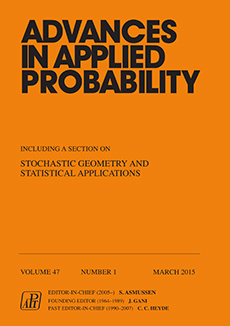Abstract
We consider a broad class of fair leader election algorithms, and study the duration of contestants (the number of rounds a randomly selected contestant stays in the competition) and the overall cost of the algorithm. We give sufficient conditions for the duration to have a geometric limit distribution (a perpetuity built from Bernoulli random variables), and for the limiting distribution of the total cost (after suitable normalization) to be a perpetuity. For the duration, the proof is established via convergence (to 0) of the first-order Wasserstein distance from the geometric limit. For the normalized overall cost, the method of proof is also convergence of the first-order Wasserstein distance, augmented with an argument based on a contraction mapping in the first-order Wasserstein metric space to show that the limit approaches a unique fixed-point solution of a perpetuity distributional equation. The use of these two steps is commonly referred to as the contraction method.
Citation
Ravi Kalpathy. Hosam Mahmoud. "Perpetuities in fair leader election algorithms." Adv. in Appl. Probab. 46 (1) 203 - 216, March 2014. https://doi.org/10.1239/aap/1396360110
Information





